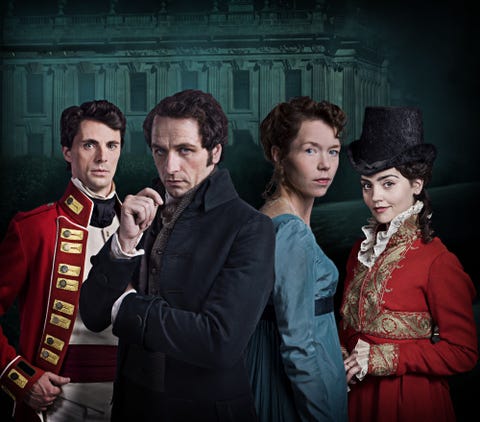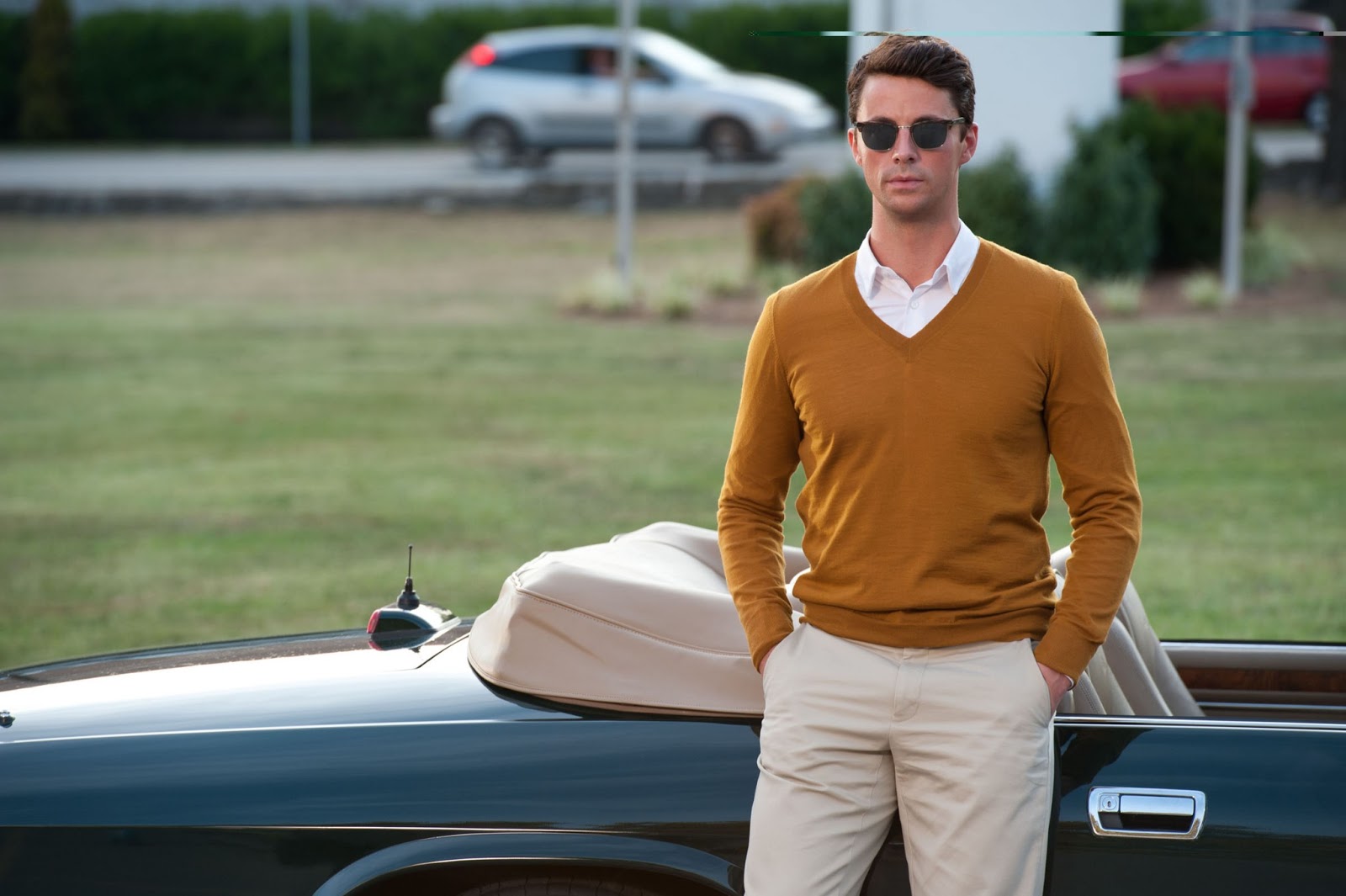Making a drama out of a classic – Yorkshire Post – 22nd December 2013 [Extracts]
Christmas needs a lavish period drama – and this year Yorkshire is providing the backdrop. Nick Ahad visits the set of Death Comes to Pemberley.
Death Comes to Pemberley: Matthew Rhys on Darcy and billowing shirts – Digital Spy – 16th December 2013 [Extract]
Get ready for a whole new Darcy – The Americans star Matthew Rhys plays literature’s most iconic lover (sorry, Heathcliff) in BBC One’s new three-part drama Death Comes to Pemberley.
Based on the novel by PD James, Death Comes to Pemberley is part Pride and Prejudice sequel, part murder-mystery and also stars Anna Maxwell Martin, Matthew Goode and Doctor Who‘s Jenna Coleman.
On set, Rhys opened up about stepping into Colin Firth’s shoes – or rather donning his shirt – and reveals why his is a very different Darcy…

Matthew is slightly jealous of his co-star Matthew Goode…
“He’s got it all – he’s got the rock star looks, the rock star attitude, hollow legs, vast knowledge. He’s like Stephen Fry – he knows something about everything… he actually knows a lot about everything.
“He’s got that voice. He gets the accent for free – I feel like a complete fake. He’s like Rik Mayall playing Flashheart.”
…
Full article here – https://www.digitalspy.com/tv/a536252/death-comes-to-pemberley-matthew-rhys-on-darcy-and-billowing-shirts/
____________________________________________________________________________________
Interview: Matthew Goode Talks About His Role in Stoker – Syndicated interview – 2nd March 2013
But it wasn’t offered by any stretch of the imagination, it was a process. Nicole and Mia were already attached, and Director Park was doing it. It was a really great script, and I knew it was going to be competitive. A few of my good friends were in the hat, and it came down to the director’s taste, I suppose. Luckily, on this occasion, he went with me. So that was nice.
Q: How did you mask the accent? Naturally, your inclination is to speak in your British accent.
MG: I don’t know. It does differ from job to job, depending on the specificity on where you’re from in a region. On this one, it was slightly easier, because it’s a Gothic horror, and you’re coming from the south. We filmed it in Nashville, because that’s Nicole’s home territory, and it was easier for her to be a mom and everything else, and also finding the right location. Also, Charlie’s trapped in the past, so he’s slightly more Anglicized, I suppose.
But it differs from job to job. But it always scares the hell out of me. But the better the script, the easier it is, I find.
Q: Do you switch back to your British accent after every scene?
MG: Yeah, I go, (thick English accent) “How was that?” (laughs) I’m too embarrassed to stay in the accent. It works for some people, and I believe everyone has their own process and method acting. You do a lot of preparation and work hard, and I think between action and cut, I’m a method actor, if that makes sense.
Q: How did you read Charlie and his relationship with India, and how evil is born?
MG: Director Park called it bad blood, and the pre-desposition in the bloodline to do these acts. My whole thing with Charlie is that he’s isolated and lonely. It’s not a vampire film, but there are things that are similar, in the fact that he’s trapped in the past, and he never really grew up. There’s almost an innocence to him.
He must have heard from Mrs. McGarrick that he had this niece who’s like him. That’s very powerful in his life, that there’s someone like him, and he’s not alone in the world. We didn’t seek to ask every question, because I think audiences are far more intelligent. I think it gets very boring when it’s like, this is concrete. With these emotions and complex psychologies, I don’t think you can answer those questions.
So I don’t think it ever got to the lengths of it become a sexual relationship. But there has always been a strong link between sex and violence, so who knows what might have happened.
I also think that it suggestions each generation becomes more intelligent. She sees Charlie, although being attracted to him, she almost sees him as having to go. It is her story, so we are bizarrely happy for her.
Q: You’re also going to be working with ‘Stoker’ producer Ridley Scott on ‘The Vatican,’ a television thriller drama he’s directing; did this project lead into that film?
MG: Ridley was behind-the-scenes on ‘Stoker,’ and wasn’t physically producing on set. Ridley was going to do ‘The Counselor’ with Michael Fassbender and an amazing cast. I was up for a part in that, and it went very close to me getting it, and (writer-producer) Cormac McCarthy said, he’s too young for that. It was really depressing.
Michael was like, he really likes you, and I’m like, great, I’m glad he likes me. I never thought of anything happening again. But Michael was like, seriously, when he likes someone, he tries to get them into something. After a short time period, he was like, I’d love to get you in this.
I was making my mind up between that job and another job. The cast in ‘The Vatican’ is great, I love Kyle Chandler.
Q: Was it a big change, going from ‘Stoker’ to ‘The Vatican?’
MG: I’ve never signed onto anything before where they have the pilot, and then they’re like, then we’ll write it. (laughs) It’s like, so what’s my character? But Paul Attanasio, the writer, is such a cool guy. But even he doesn’t know what’s going to happen, so I’m like, figure it out, would you?
Hopefully it will go to series. It’s nice for me as a parent that it’s going to shoot in Rome, and then it’s going to move to London. So I’ll be hope, which will be easier.
Q: What was it like working with a director on ‘Stoker’ who doesn’t speak much English?
MG: It was actually quite easy. He understands more than he can speak. But ultimately, and not to sound facetious, but it was hard to know who to look at in the beginning. But it was easy, and we looked at him, and then at the translator.
We’d start the day by chatting about the scene. Then after the scene, he’d come over to the translator, and you work out shorthand. Between more extended setups, you’d have more extended scenes.
Intro Written by: Karen Beanrdello from Shockya.com – rest is syndicated Q & A
_______________________________________
Some naked truths about film nudity: Are you listening, Seth MacFarlane? [includes phone interview with Matthew Goode about Stoker] – THE GLOBE AND MAIL – 1st March 2013 – Extract
Matthew Goode Talks STOKER, DANCING ON THE EDGE, BEFORE WATCHMEN and BELLE
FEBRUARY 28, 2013 – Collider.

There’s just something eerie about Matthew Goode (Watchmen). It’s almost as if the poor guy is too damn good looking, his smile a little too perfect, his hair too evenly keeled and parted… There must surely be something wrong with him. If it is human instinct to weed out the proper characteristics of even the most undesirable of beings, then the opposite must also be true. One can’t help but search for any imperfection to poor ol’ Goode’s character. Behind that smile and hair, there must lurk something less. And Goode uses that to his full advantage. As the too charming, too handsome Uncle Charlie in the melodrama-masquerading-as-a-thriller Stoker, Goode revels in the malevolence hiding just underneath his pearly whites. After the sudden death of his brother, Uncle Charlie shacks up with his sibling’s widowed wife and young daughter under the guise of helping them through their grief. Of course his true intentions are far more perverse and sinister.
In the following interview with Goode, he discusses his distaste for most horror films, working with the meticulous Park Chan-Wook (Sympathy for Mr. Vengeance) and his upcoming roles in television (BBC’s Dancing on the Edge) and film (the period piece Belle). For the full interview, hit the jump. [Available on YouTube]
Matthew Goode:
- 00:00 – Mathew Goode on his distaste for most horror films and what drew him to Stoker
- 01:24 – On working with Park Chan-Wook
- 02:18 – Has he been following the Before Watchmen comic series?
- 02:32 – Differences he finds between television and film
- 03:02 – Dancing on The Edge – Does the ‘period piece’ aspect of the project interest him?
- 03:22 – On his character in the upcoming Belle
_____________________________________________________________________________________


